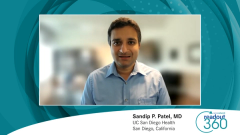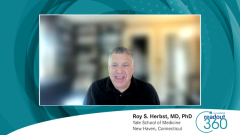
Understanding the Impact of EGFR Mutations on NSCLC Management
Roy Herbst, MD, PhD, provides insight on the importance of EGFR mutations, both common and rare, in patients with non–small cell lung cancer.
Episodes in this series

Transcript:
Roy S. Herbst, MD, PhD: Epidermal growth factor receptor [EGFR] is the receptor for epidermal growth factor, which is of course a growth stimulator. It stimulates cells to grow. They are mostly in epithelial cells, the lining of the skin, GI [gastrointestinal] tract, and tumors of epithelial origin like adenocarcinomas: lung, breast, colon, and prostate. This is a natural receptor that is part of the whole tumor microenvironment that causes a tumor or normal cells to grow. Tumors propagate this and take over this receptor. What happens is a mutation occurs in this receptor in the tumor cells that causes the tumor to grow abnormally and to be addicted to this growth factor that is turned on at a much higher rate. That happens with EGFR, and tends to happen in people who have not smoked. If you have smoked, you tend to develop KRAS mutations and other mutations that become dominant over the EGFR, so you never see the 2 together. But in light smokers or never smokers in Asia, you get this EGFR mutation, and this mutation is present in the tumor and drives that tumor to grow. It’s a gas for that tumor, thus causing it to grow, which is the bad news. But the good news is that because the tumor is so dependent on this 1 growth factor, if you knock it down, it’s like cutting off the gas line. This tumor should shrink, and that’s what happens.
I know about epidermal growth factor receptors well because I was part of this work. In 1996 and 1997 we did the first trials with gefitinib and erlotinib, and over time, it was in about 2004, mutations were discovered. These drugs were used for a while, and seeing response in about 10% of patients before the mutational context was discovered. Now of course, these drugs are used not only in the frontline setting, but now for resistance we are trying to find out how to target mutations that develop. This is a receptor, it’s a target. We have drugs to hit the target, and if the target changes we are working on new drugs there. But it is clearly an example of how we really are advancing care in lung cancer.
We have the common, or we call them canonical mutations. They are more common, the ones that were discovered first when we only were sequencing 20, 40, 50 patients. There is exon 19 of the EGFR gene. Exon 19 has deletions in EGFR, deletion in that piece of DNA, and in exon 21, there is a point mutation, it’s called L858R. Those are some of the most common mutations, sometimes called canonical mutations, the ones that will be included in most trials. I want to be precise, they will look at those 2 mutations. For now, we know that there are other mutations that occur in exon 21, and now we know exon 20, in the middle between exon 19 and 21, can have a whole host of mutations as well. These mutations are not quite as common, but they are also less predictable because these mutations may or may not the cause the cell to grow based on EGFR. Sometimes they are not activating mutations, they are there, but you can target them and nothing will happen.
The drugs that we use don’t always work in exon 20, and are much better in exon 19 and 21 based on the conformation of the EGFRreceptor. These drugs that we use fit in the ATP [adenosine triphosphate] binding pocket, but it might be, depending on these other mutations, it doesn’t allow the drug to fit into the pocket or it doesn’t activate. Either way, if the cell is not being driven by that gas, blocking that gas line is not going to matter, or if it is but the area where we try to block has changed, it won’t work. We have personalized medicine. Personalized medicine means if a patient has an EGFR mutation, then we have personalized EGFR therapy. What mutation do they have, and what drug do we use to treat that specific mutation? This is all very exciting and interesting. It’s science coming to the clinic to help more patients.
Transcript edited for clarity.
Newsletter
Stay up to date on recent advances in the multidisciplinary approach to cancer.
Related Content

Optimizing the Use of Hypofractionated Radiotherapy in Lung Cancer Care


OncoPrism-NSCLC Test Predicts Key Clinical Outcomes in Lung Cancer










































